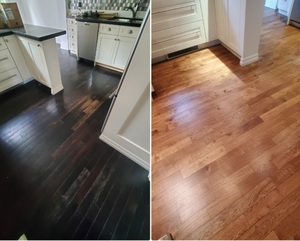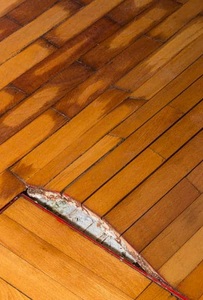How to Decide If Your Hardwood Floors Need Refinishing or Replacement
Hardwood floors are a timeless feature in any home, but over the years, wear and tear can rob them of their charm.
You’ve noticed scratches, dull spots, or even a few creaky boards underfoot. It’s frustrating—those floors once elevated your space, but now they’re dragging it down.
What’s worse, neglecting the issue can lead to more significant damage, making your home feel less inviting and potentially reducing its value. If left unchecked, those imperfections could mean costly repairs or even structural issues in the future.
So, how do you know if your hardwood floors just need a little TLC or if it’s time to start fresh? In this article, we’ll guide you step by step to help you decide whether refinishing or replacing is the best solution for your floors.
Understanding the Condition of Your Floors
The first step in deciding is to assess the condition of your hardwood floors. Are the problems cosmetic, or do they run deeper?
Hardwood floor refinishing is your best option if:
- The surface has scratches or dullness but is structurally sound.
- You want to restore the original beauty of the wood without a significant investment.
- Your hardwood floors haven’t been refinished too many times before (solid wood can usually handle 4-6 refinishes).
Hardwood floor replacement becomes necessary when:
- Structural damage is evident (e.g., sagging or warping).
- Floorboards are loose, causing movement when you walk.
- Deep gouges, cracks, or water damage compromise the integrity of the wood.
Side Note: Not sure where your floors stand? A professional inspection can help you evaluate the severity of the damage and determine the best course of action.
Signs Your Hardwood Floors Need Refinishing
Refinishing is like giving your floors a facelift. It involves sanding down the top layer of the wood and applying a fresh stain and finish.
Look for these signs that refinishing is enough:

Scratches and Scuffs: Minor surface damage from pets, furniture, or foot traffic.
Dull Finish: The shine is gone, and the wood looks faded or dry.
Discoloration: Sunlight or wear has caused uneven tones across the surface.
Quick Tip: A water droplet test can reveal if your finish is worn. Drop a small amount of water on the floor—if it beads, your finish is still intact. If it soaks in, it’s time to refinish!
When It’s Time for Hardwood Floor Replacement
Sometimes, no amount of sanding can save your floors. Here are telltale signs that replacement is the only viable option:

Structural Damage: If the subfloor is compromised, replacing the hardwood is the safest choice.
Excessive Movement: Squeaks and wobbles may indicate underlying issues that refinishing can’t fix.
Severe Flooring Damage: Deep cracks, chips, or extensive water damage make replacement inevitable.
Extreme Wear: If your floors have already been refinished several times, the wood may be too thin for another round of sanding.
Side Note: Modern flooring options like engineered wood or luxury vinyl can mimic the look of hardwood while offering better durability for high-traffic areas.
Exploring Replacement Options
If replacement is the right choice, you’ll want to pick a flooring option that suits your lifestyle and design preferences.
Solid Hardwood Floors:
- Timeless and durable.
- Can be refinished multiple times.
- Best for homeowners seeking an authentic wood look.
Engineered Hardwood:
- Features a real wood veneer over a plywood core.
- Resists humidity better than solid wood.
- A great middle ground between durability and aesthetic appeal.
Laminate Flooring:
- Affordable and scratch-resistant.
- Offers a wide range of styles but lacks the warmth of real wood.
Luxury Vinyl Plank (LVP):
- Mimics the look of wood while being water-resistant.
- Perfect for areas prone to moisture, like kitchens and basements.
Pro Tip: Consider the room’s purpose and traffic levels before choosing your new flooring material. Bedrooms might benefit from the warmth of solid wood, while basements are better suited to engineered options or LVP.
Refinishing vs. Replacing: Costs and Timeline
Refinishing:
Cost: Typically $4–$7 per square foot, depending on the finish and condition.
Timeline: 3–5 days for most homes.
Replacing:
Cost: Ranges from $10–$15 per square foot for materials, removal and installation.
Timeline: 1–2 weeks, depending on prep work and the size of the space.
Side Note: Keep in mind that refinishing may be more cost-effective in the short term, but replacement could save you money in the long run if the floors are nearing the end of their life.
CONCLUSION
Deciding between refinishing and replacing your hardwood floors doesn’t have to be daunting. By assessing the damage, understanding the signs, and considering your budget, you can make an informed choice that elevates your home’s aesthetic and functionality.
If your floors are scratched but structurally sound, refinishing can bring them back to life. However, for severe damage or wear, replacement ensures a lasting solution and fresh start.
Ready to take the next step? Give Tiptop Flooring a call at 647-317-0707 or schedule an in-home consultation, and we will help you decide whether your floors can be refinished or need to be replaced. Visit our website to learn more about our attention to detail and our commitment to quality.
Don’t let your floors hold you back—restore or replace them today for a home you’ll love walking into.
